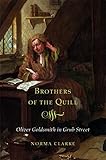Brothers of the quill : Oliver Goldsmith in Grub street / Norma Clarke.
Material type: TextPublication details: Cambridge, Massachusetts : Harvard University Press, (c)2016.Description: 1 online resourceContent type:
TextPublication details: Cambridge, Massachusetts : Harvard University Press, (c)2016.Description: 1 online resourceContent type: - text
- computer
- online resource
- 9780674968721
- PR3493 .B768 2016
- COPYRIGHT NOT covered - Click this link to request copyright permission: https://lib.ciu.edu/copyright-request-form
| Item type | Current library | Collection | Call number | URL | Status | Date due | Barcode | |
|---|---|---|---|---|---|---|---|---|
 Online Book (LOGIN USING YOUR MY CIU LOGIN AND PASSWORD)
Online Book (LOGIN USING YOUR MY CIU LOGIN AND PASSWORD)
|
G. Allen Fleece Library ONLINE | Non-fiction | PR3493 (Browse shelf(Opens below)) | Link to resource | Available | ocn946725270 |
Includes bibliographies and index.
Part one: Grub Street -- An Irishman in London -- "Borderers upon Parnassus" -- The philosophic vagabond -- Covent Garden -- Authors by profession -- Writing for the press -- Beau Tibbs -- The real story of John Carteret Pilkington -- Part two: Man of letters -- Debauchery -- The vicar of Wakefield -- James Grainger and the sugar-cane -- Robert Nugent and son -- The good natured man.
"Brothers of the Quill takes a familiar eighteenth-century theme - Grub Street, the trials and tribulations of professional writers in the early days of commercial literature - and brings a new perspective to it. It follows the early career of Oliver Goldsmith, who in 1756 arrived destitute in London - an Irish 'vagabond' -and within a few years rose out of Grub Street anonymity to become a celebrated author. It investigates Goldsmith's literary themes and choices, his friendships and reputation in the context of the parallel careers of some of his associates. Brothers of the Quill looks beyond the famous 'Club' of Johnson, Reynolds, and Burke, and beyond the condescending anecdotes that fixed Goldsmith as "an anomalous creature" in polite eighteenth-century English culture, to find more complex ways of understanding his achievement. It takes seriously his Irishness and his sophistication. It delves deeply into key eighteenth-century issues that figure in Goldsmith's writings because they troubled his life: colonial power, patronage, libertinism, prostitution, gambling, debt and imprisonment, slavery and indenture, enclosure and absenteeism. Goldsmith became one of the best-loved writers in English literature, especially for The Vicar of Wakefield, She Stoops to Conquer, and The Deserted Village (a novel, a play, a poem), but he is no longer much read and his stature has never been properly acknowledged. Goldsmith transmuted dark realities into fable, fun, and nostalgia. His ability to tell stories and elaborate myths brought fame and fine living. Brothers of the Quill argues that it is time to look again at Oliver Goldsmith."--Provided by publisher.
COPYRIGHT NOT covered - Click this link to request copyright permission:
There are no comments on this title.
